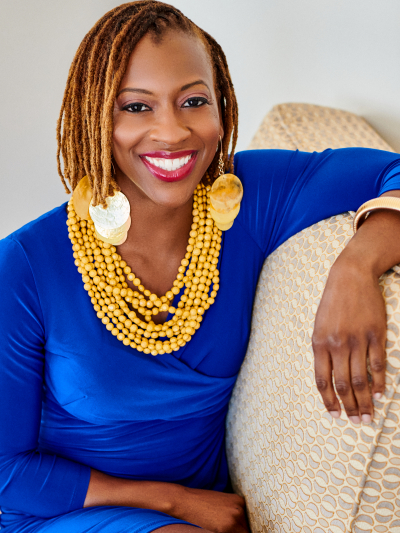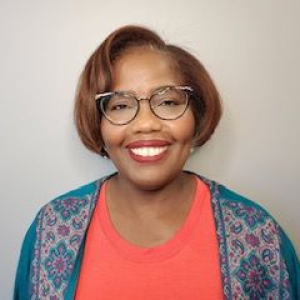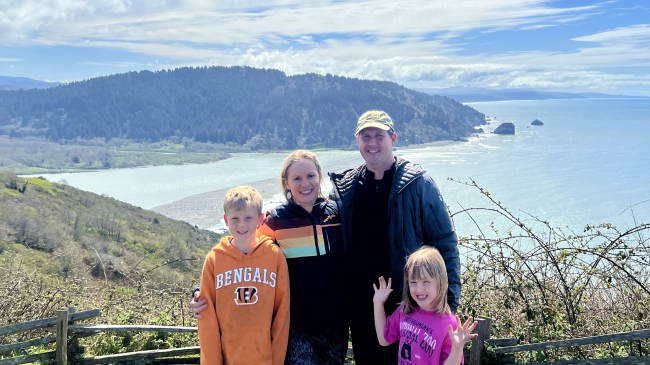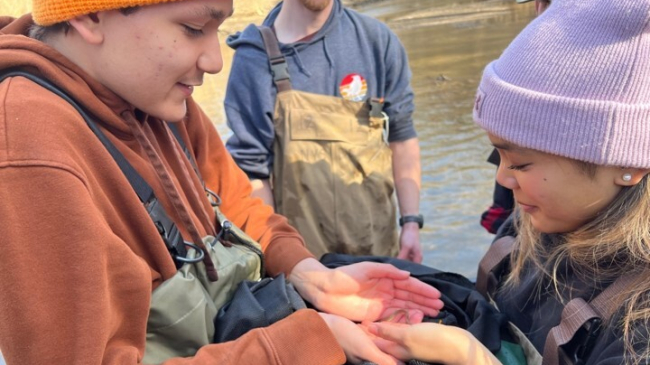Five NOAA employees were recognized at the annual Women of Color STEM Digital Conference offsite link, which was held virtually October 7-9, 2021. These awards highlight significant achievement in science, technology, engineering, and math (STEM).
Women of Color in STEM logo. (Image credit: Women of Color in STEM Conference)
“Congratulations to NOAA’s 2021 Women of Color in STEM awardees,” said Louisa Koch, Director of NOAA Education. “These women are being recognized for outstanding accomplishments in their NOAA STEM careers. We are delighted to celebrate their achievements in support of NOAA’s mission of science, service, and stewardship.”
Get to know these NOAA employees as they share their paths to a career at NOAA and their advice for future STEM leaders.
Technology Rising Star Awardees
Rising Stars offsite link are young women, with 21 years or less in the workforce, who are helping to shape technology for the future.
Janae Elkins
Meteorologist, National Weather Service Jackson Mississippi Forecast Office
... remember to always stay true to yourself and your core values. Learn as much as you can from those around you and NEVER be scared to ask for help. Be Bold, Be Proud, and always BE YOU!
How did you get your start at NOAA?
I graduated from Jackson State University (JSU) in 2018, which for a long time was the only Historically Black College or University with an undergraduate meteorology program. While attending JSU, I had a unique opportunity to be a part of one of NOAA's Cooperative Science Centers, NOAA’s Center for Atmospheric Science and Meteorology offsite link (the Center’s acronym was previously NCAS, now NCAS-M). Through NCAS I had many NOAA and National Weather Service (NWS) mentors, paid internships, and several opportunities to attend national conferences and meetings at NOAA Headquarters in Silver Spring, Maryland. Along with being exposed to NOAA through NCAS, the JSU meteorology program has a strong alumni network. Several NOAA employees who are JSU alumni would come back and speak to students and provide mentorship. Because of this, I became interested in NWS and eventually sought employment where I currently reside at the Weather Forecast Office in Jackson, Mississippi.
Do you have advice for early-career STEM professionals or students who are interested in STEM?
The STEM field has a world of opportunities that oftentimes go unnoticed. I would encourage students to explore all options and never put all of your eggs into one basket. Seek out mentors not only for your career or at school, but also for someone you can call on if and when life starts to become overwhelming. During the early career stage you will experience many different emotions but remember to always stay true to yourself and your core values. Learn as much as you can from those around you and NEVER be scared to ask for help. Be Bold, Be Proud, and always BE YOU!
Talking, asking questions, and opening up has helped me gain multiple mentors throughout my career ... I would not be where I am today without the support of unofficial and official mentors in NOAA.

How did you get your start at NOAA?
I started at NOAA's National Ocean Service after graduating from Central State University in 2007. I worked as a contractor for ten years before I received a position as a federal employee. Throughout my career, I've worked as an administrative assistant, project analyst, and budget analyst. I am currently the commercialization specialist of the NOAA Small Business Innovation Research Program within NOAA Research. I'm honored to serve in my role of doing everything I can to help small businesses get their technology or products to the marketplace; it is not only a super fantastic job but critical support for small businesses.
Do you have advice for early-career STEM professionals or students who are interested in STEM?
I encourage early-career STEM professionals or students who are interested in STEM not to be afraid to ask. Talking, asking questions, and opening up has helped me gain multiple mentors throughout my career. My mentors have guided and motivated me in my professional and personal life. I would not be where I am today without the support of unofficial and official mentors in NOAA.
Don't limit yourself to the possibilities of learning about your future career. Lastly, don't limit yourself in what you apply for. Just because you may start in a position adjacent to the career path you want doesn't mean you have to stay in that position.
How did you get your start at NOAA?
I started my career at NOAA through an internship with the National Weather Service (NWS) Forecast Office in Wakefield, Virginia, as a meteorological aide in 2002. During my internship I learned about every aspect of the meteorologist positions at the office. I even acted as a hydrometeorological technician when the full-time employees took leave during the day shift. After graduating from college, I moved to Maryland in hopes of increasing my chances of getting a job at NOAA Headquarters. In 2005, I became an oceanographic data analyst, federal government contractor, for the National Ocean Services' Center for Operational Oceanographic Products and Services (CO-OPS). In 2010, I became a full-time federal employee in the position of Oceanographer with CO-OPS.
Do you have advice for early-career STEM professionals or students who are interested in STEM?
Make every effort to get an internship no matter the distance, duration, or compensation. Having NOAA on my resume early in my career really stood out to hiring officials and recruiters. The experience that I gained was invaluable. If you can't intern, try shadowing someone in the position that you desire to be in. Ask if they can be your mentor or if you can interview them about their career journey. Don't limit yourself to the possibilities of learning about your future career. Lastly, don't limit yourself in what you apply for. Just because you may start in a position adjacent to the career path you want doesn't mean you have to stay in that position.
Technology All-Star Awardee
Technology All-Stars offsite link are accomplished women of color from mid-level to advanced stages of their career (with 22 years or more in the workforce) that have demonstrated excellence in the workplace and in their communities.
Jennifer Melton
Chief, NOAA Environmental Compliance Division/Safety and Environmental Compliance Office
Take advantage of these [early-career STEM] positions to hone your technical skills. It will offer a firm foundation in the future when managing broader projects, programs, and staff.
How did you get your start at NOAA?
After working for the U.S. Army Corps of Engineers as a plant operations engineer and then with the Department of the Navy as a remedial project manager, I came to NOAA as the manager of the Environmental Compliance Division within the Safety and Environmental Compliance Office. While in this role, I have grown the division to better support NOAA Line Offices and Corporate Services, enabling them to execute their mission while maintaining compliance with all applicable environmental laws and regulations aimed at protecting human health and the environment.
Do you have advice for early-career STEM professionals or students who are interested in STEM?
Generally, early-career STEM positions are more technical in nature. Take advantage of these positions to hone your technical skills. It will offer a firm foundation in the future when managing broader projects, programs, and staff. Also, maintain membership in technical and professional organizations to stay abreast of the most current technologies and networking opportunities.
Special Recognition Awardee
Rita Williams
Budget Analyst, Great Lakes Environmental Research Laboratory
[Asking mentors about their career, their hardest obstacle, and what they would do differently] will give courage when you doubt yourself or when you question why you chose this career path and to encourage you when you feel like giving up.

How did you get your start at NOAA?
I started my career with the federal government in 2008 as a Budget Analyst for the Great Lakes Environmental Research Laboratory. It has been the best career choice I made, it has allowed me to meet many mentors, leaders, and friends who have always encouraged me to grow in this field.
Do you have advice for early-career STEM professionals or students who are interested in STEM?
My advice to early career STEM or any student, is to decide what type of profession you want to go into. Then do your research on that position, take some intro classes in that field, and if you still want to pursue it then seek out someone who is doing the exact same job or similar job and have a conversation with that person. During that conversation, you can ask them many things, but make sure you ask them these three questions:
- Why did you choose this career,
- What was your hardest mountain you had to climb, and
- What would you do differently?
If you ask these three questions, you will get nuggets that will help you when challenges show up. It will give courage when you doubt yourself or when you question why you chose this career path and to encourage you when you feel like giving up. “Success is not final, failure is not fatal: it is the courage to continue that counts.” – Winston Churchill



